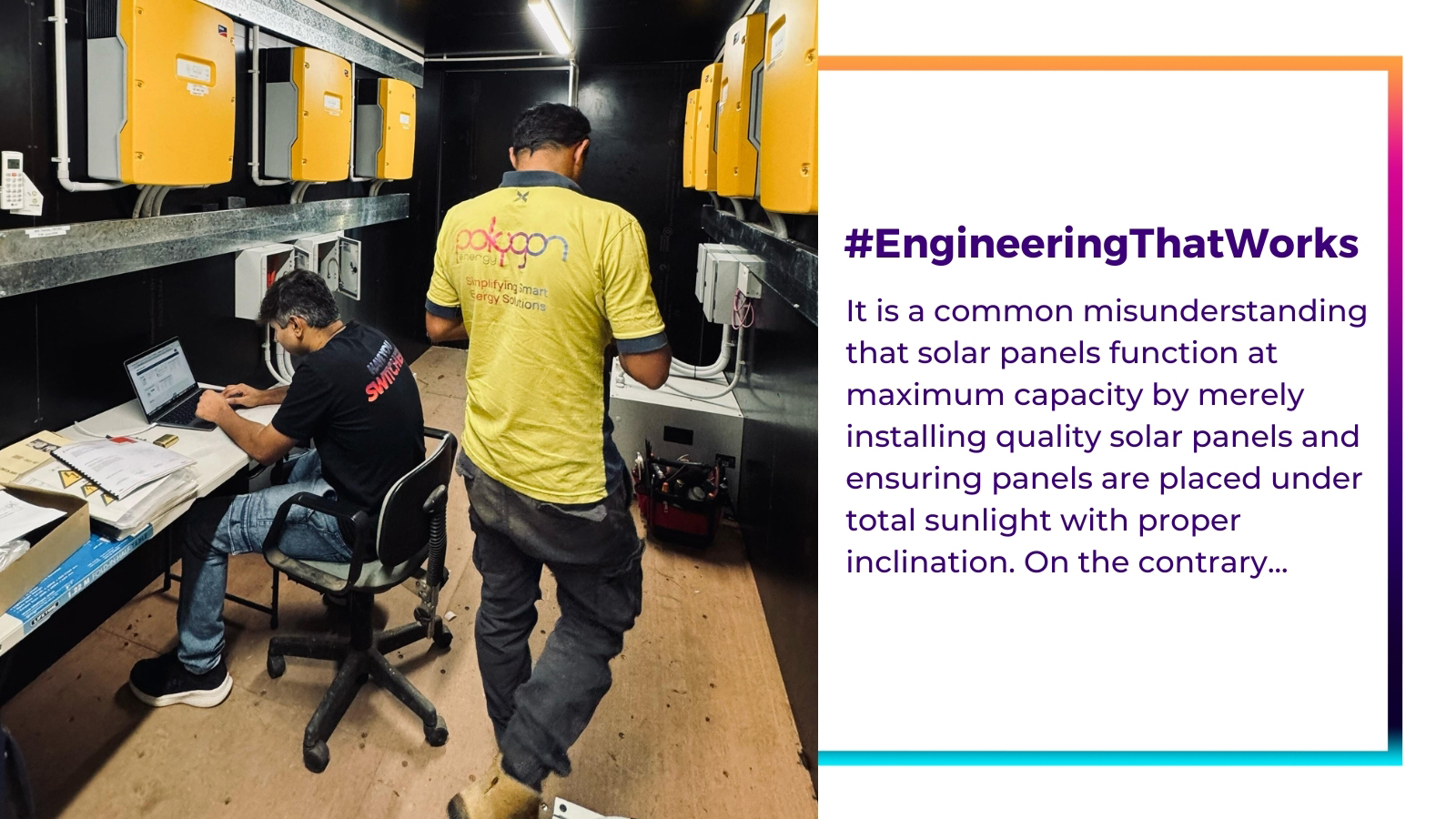Optimizing Solar Performance Through Engineering Designs

Installing solar panels on your rooftop is a positive approach toward embracing sustainability and energy independence. However, it is equally important to ascertain that you are obtaining maximum benefit from your solar installation and that your solar system is performing efficiently.
It is not just factors such as solar panel orientation, shading, panel tilt, monitoring system, etc., that impact solar performance; much thought-over engineering considerations make a massive difference in how efficiently panels convert sunlight into solar energy.
In this article, let us delve into engineering aspects that you may want to consider if you plan to extract maximum benefit and energy from your solar installation.
Significance of a Detailed Engineering Design
Installing a solar system at a residence/business establishment needs careful planning and execution. However, such a solar installation coupled with a detailed solar engineering design ensures that the installation is more than just structurally correct but functionally optimal. A thoroughly planned design assures maximum energy yield from your investment.
With the technical proficiency to access factors such as existing terrain, roof space, appropriate technology, and system configuration, solar design engineers play a vital role in shaping a perfect customized solar solution “For You.” Investing time in feasible and reliable solar engineering design in the early stages of your solar installation takes care of any unforeseen technical or structural issues that may creep up over time.
You can conveniently enjoy the benefits of solar energy without worrying about issues that would otherwise emerge without a thorough engineering design plan.
Engineering Considerations that Impact Overall Solar Performance
It is a common misunderstanding that solar panels function at maximum capacity by merely installing quality solar panels and ensuring panels are placed under total sunlight with proper inclination. On the contrary, well-crafted engineering designs are at the core of better-performing solar systems. Though these designs and considerations are the lesser-known and understood factors, they significantly affect system performance.
Here is a list of such factors that you may want to consider if you wish to achieve optimal output from your solar panels:
- Avoid Losses in a System – Occurs due to various factors such as conversion inefficiencies, shading, soiling, and mismatch between components. It is essential to minimize these losses to optimize system performance and ensure maximum energy output.
- Voltage Rise and Drop – Manage Voltage rise and drop within acceptable limits to maintain system stability and prevent damage to equipment. To avoid any fluctuation in the voltage, adopt proper voltage regulation techniques and seek help selecting the right equipment.
- Cable Sizing and Routing – Appropriate cable sizing and routing are crucial to minimize voltage drop, reduce energy losses, and ensure the safe and efficient operation of the system. Consider these factors while selecting a cable: distance, current carrying capacity, and environmental conditions.
- System Specification – Parameters like efficiency, maximum power point tracking (MPPT) capability, reliability, and compatibility with other system components are vital in selecting inverters and solar panels. Panel characteristics such as wattage, voltage, and temperature coefficients significantly affect system performance.
- Component Capabilities – Understanding the capabilities of each component, such as inverters, charge controllers, and batteries, is essential for proper system design. Considerations include maximum power handling capacity, efficiency ratings, and operating conditions.
- System Configuration and Settings – Proper configuration and settings of system components include configuring inverters for grid-tie or off-grid operation, setting charge controller parameters, and optimizing system settings for maximum efficiency. These system configurations and settings are necessary for optimal performance and safety.
- Importance of System Oversizing for Battery Charging – Oversizing solar arrays relative to battery capacity ensures efficient charging even under suboptimal conditions like low sunlight or high energy demand. Oversizing solar panels extends battery life and improves system reliability, optimizes battery charging capability in the DC coupled mode, and reduces losses.
- Choice of Batteries Based on Charging and Discharging Capabilities – Selecting batteries with appropriate charging and discharging characteristics is critical for meeting system requirements. Factors such as cycle life, depth of discharge, charging efficiency, and self-discharge rates influence battery selection.
- Capacity of Batteries to Handle Power Surges – Batteries should be capable of handling power surges during charging or discharging without compromising performance or safety. Select batteries with adequate surge capacity and robust construction for batteries to handle power surges. Selecting suitable batteries is a significant consideration, especially in the off-grid setup and grid-connected systems where the full-back is preferred.
- Role of Depth of Discharge (DoD) and Actual Usable Capacity of Batteries and Settings during Battery Commissioning – Managing depth of discharge helps maintain battery health and prolongs its lifespan. Understanding the actual usable capacity of batteries and setting appropriate DoD limits during commissioning is essential for optimal battery performance and longevity.
- Regulatory Obligations, Anti-islanding, and Voltage Thresholds – Compliance with regulatory requirements such as anti-islanding protection and voltage thresholds is essential for safety and grid integration. You must configure inverters to meet these obligations, ensuring seamless operation and adherence to standards.
Polygon’s Engineering Expertise to Maximize Your Investment
If you are considering venturing into solar and looking for a solar system with not just top-notch installation but also solar design aspects taken care of, then Polygon Energy is your choice.
The solar engineers at Polygon Energy meticulously work on holistic designs that consider multiple factors so that YOU get maximum solar energy output from your panels and benefit the most from the investment. Our CEC-accredited Solar Engineers orchestrate the layout of panels, inverters, electrical components, and more to optimize the amount of electricity your solar system can produce.
To experience how a well-crafted Solar Design can make a difference to a solar system, contact us today – by email or SMS. Our Solar Experts will gladly assist you with all your Solar Design needs!
